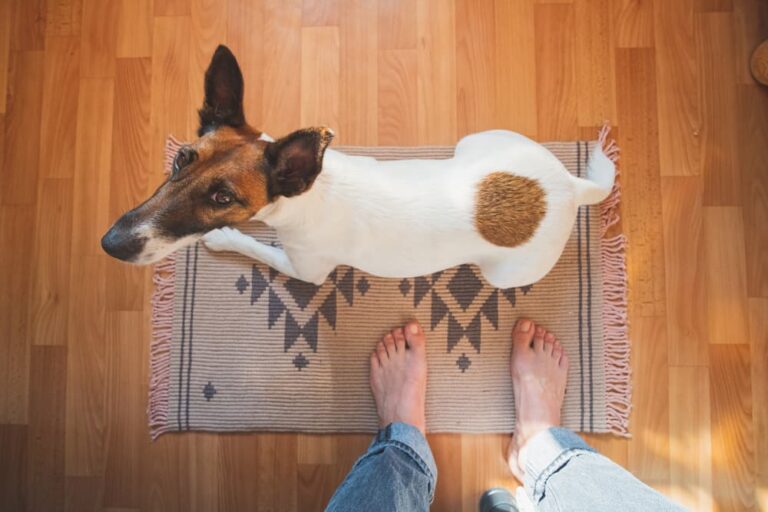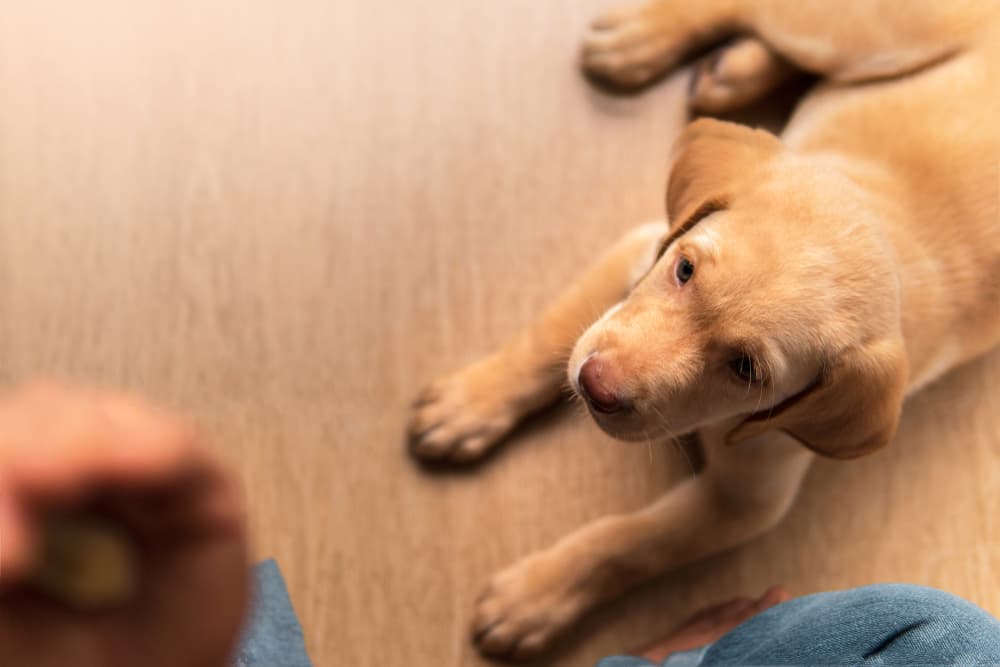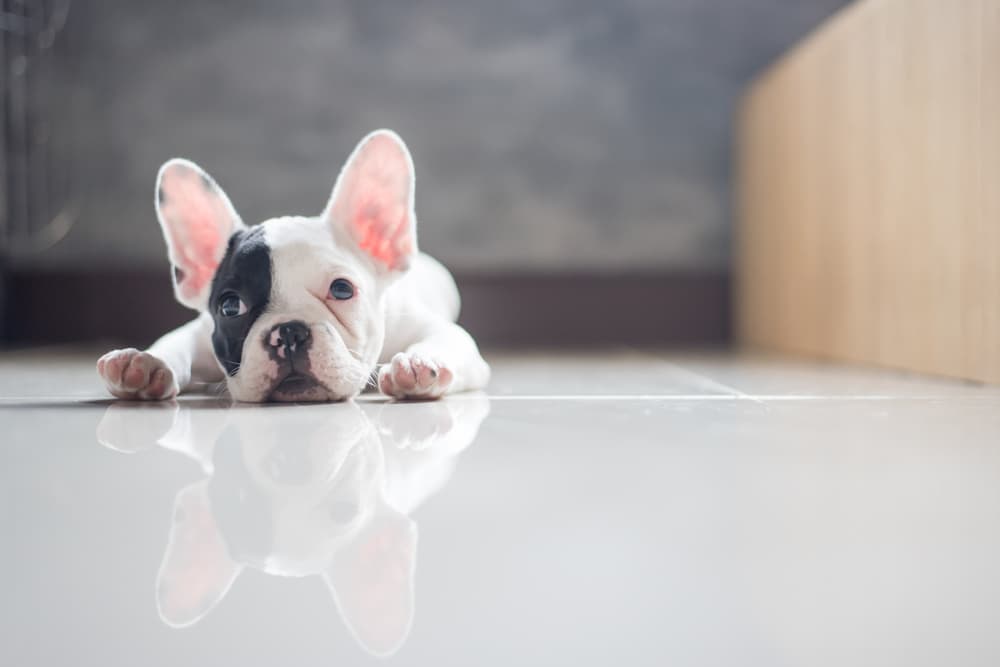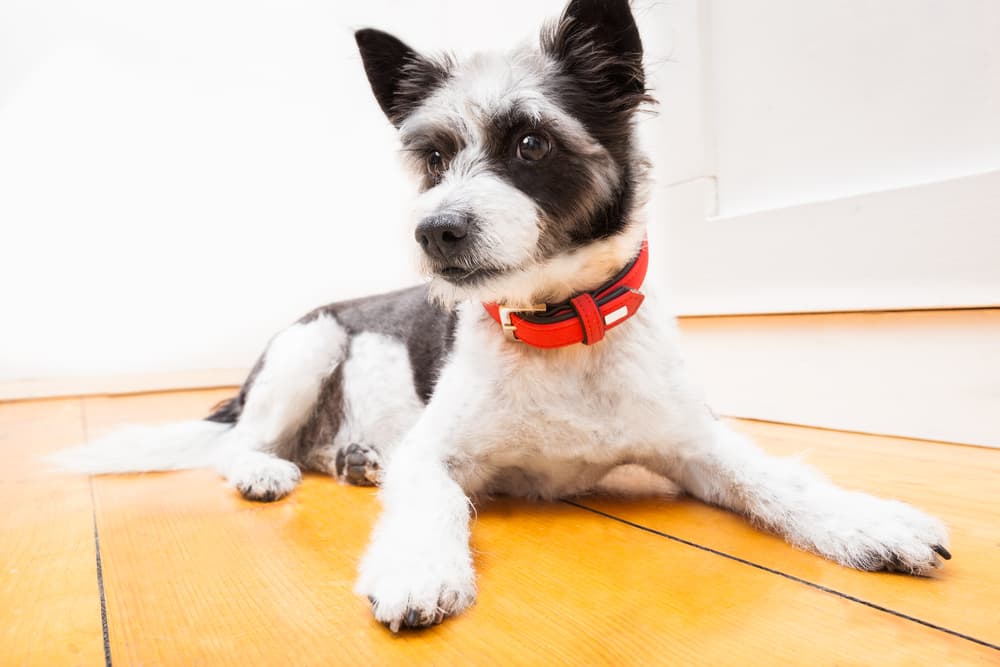6 Reasons Your Dog Follows You Everywhere

It’s six o’clock in the morning. You stumble out of bed, half asleep, to make that oh-so-necessary cup of coffee and nearly fall flat on your face because your dog is following you a little too closely. Surprising? Not really. Your dog follows you everywhere.
Most dog owners have experienced some variation of this scenario at some point or another, and, for some, it may even be a daily occurrence. But why do dogs follow you everywhere? And is this behavior normal? Read below to find out.
What Does It Mean When Your Dog Follows You Everywhere?

Dogs were first domesticated at least 15,000 years ago (1). They went from being wolves living in packs to dogs living in packs with humans. One of the biggest reasons that humans bred dogs was for companionship.
For this reason it is easy to see why your dog might follow you everywhere. Humans and dogs have a mutually beneficial relationship, each providing the other with companionship. Humans also provide dogs with food, shelter, and safety.
Some breeds of dogs, like terrier breeds, are more independent and may be less prone to following their owners. While other breeds are “velcro dogs,” sticking like glue to their pet parents. Toy breeds, such as Chihuahuas, were mostly bred to be our little friends. They tend to bond very closely with one person and will likely follow in their human parents’ footsteps.
Herding dogs, including Border Collies and Labrador Retrievers, were bred to follow human orders to perform specific jobs. For this reason, they may also follow their owner’s every move.
If you brought home your dog before the age of about 12 weeks, he most likely imprinted on you, seeing you as a parent-type figure. Puppies will typically follow their two-legged parents very closely and may do so less once they mature and become more confident in different situations.
Why Does My Dog Follow Me Everywhere?

Besides having tasty treats in your pockets, your dog may be following you around for the following reasons:
It’s Time For Dinner or a Walk
Dogs remember their daily routines and if you always feed your pup at the same time of day or go for a walk at seven in the morning every morning, he will get excited around those times and will likely follow your every move in anticipation of his reward.
They Want Attention
A dog often follows his humans around because he received attention or some other form of reward in return for this behavior. If following their pet parent around leads to treats, play time, or pets, dogs will remember and perform the behavior more frequently.
Most people will find this behavior endearing. However, if shadowing behavior becomes excessive it may become annoying and can be dangerous to you or your dog if the behavior causes you to trip.
They’re Afraid
Many dogs are scared of certain noises, like fireworks or thunderstorms, and may cling to their pet parents during these times. Our dogs see us as their protectors and staying near to us helps to calm them and make them feel safe.
They’re Bored

If your dog is laying around all day with nothing exciting to do, he may focus more on you and tend to follow you around more—especially if that is the only action going on around him.
They’re Trying To Tell You Something
If your dog suddenly follows you everywhere, try following him back and see if he is trying to lead you somewhere, like outside to go to the bathroom or to an empty water bowl. He just might be trying to get you to notice something.
Your dog may also begin following you around to tell you he doesn’t feel well or is sick.
Separation Anxiety
Separation anxiety is a very common behavioral disorder, with one study finding a prevalence of 17 percent in a large population of dogs (2). Dogs with separation anxiety tend to follow their pet parents excessively and feel frantic or they panic when left alone. When pet parents make a big deal about arriving home and leaving the house, this can worsen anxiety behaviors.
Why Do Dogs Follow You to the Bathroom?

Any of the above reasons may cause your dog to follow you into the bathroom. Dogs also have an excellent sense of smell, so they may find the odors coming from bathrooms intriguing. An unpleasant smell for us is likely an intriguing smell for our dogs.
Plus, bathrooms tend to have open garbage cans filled with tissues and other waste products that dogs enjoy sniffing through and tearing up. If you notice your dog going through the bathroom garbage, add a lid or keep the door closed!
Why Does My Elderly Dog Follow Me Everywhere?
As dogs become old or geriatric, it‘s common for them to develop symptoms of cognitive dysfunction syndrome (CDS), also known as “doggie dementia.” CDS is caused by a degeneration of the brain. Common symptoms include disorientation, change in sleep-wake cycles, and anxiety behaviors. This may be a reason your old dog suddenly acts more clingy.
Elderly dogs are more prone to developing illnesses and chronic conditions. Therefore, any new behavior could also be the signal of a medical problem.
How to Stop Your Dog From Following You Everywhere

Most of the time your dog’s shadowing behavior is nothing to worry about. However, if this behavior becomes excessive, you can try strategies at home to limit your dog’s clingy behavior.
Increase Your Dog’s Exercise
You can help decrease how much your dog follows you around by making sure he receives plenty of daily exercise. A tired dog is a calm dog. Many dogs will follow their owners around due to boredom. Providing your dog with food-filled toys, treat dispensers, and puzzle toys helps stimulate his brain and alleviate boredom. This will also distract his energy away from you.
Stop Reinforcing the Behavior
Another thing that pet parents should do is evaluate if they are reinforcing their pup’s behavior. Are you staring at your dog and petting him when he is following you around? This is reinforcing his behavior because you are rewarding the behavior with your attention.
Instead, try ignoring the undesired behavior and reward your dog by giving him a treat or scratches when he settles down onto his bed or takes his attention off of you to play with a toy.
Do not scold your dog for following you around. This can lead to fear and may also reinforce the behavior as a result of you giving your dog attention when the behavior is performed.
Consult Your Vet
If your dog is normally pretty independent, but all of a sudden becomes excessively clingy, it’s time for a trip to your veterinarian. While an increase in shadowing behavior may be due to a behavioral or environmental issue, it could be a sign of an underlying medical condition.
A veterinarian will perform a thorough physical exam and run laboratory tests to rule out a serious problem. If no medical issues are detected, and you’d like to give your dog more independence, your veterinarian may be able to recommend a trainer or behavior specialist who can help you address or modify your dog’s following behaviors.









